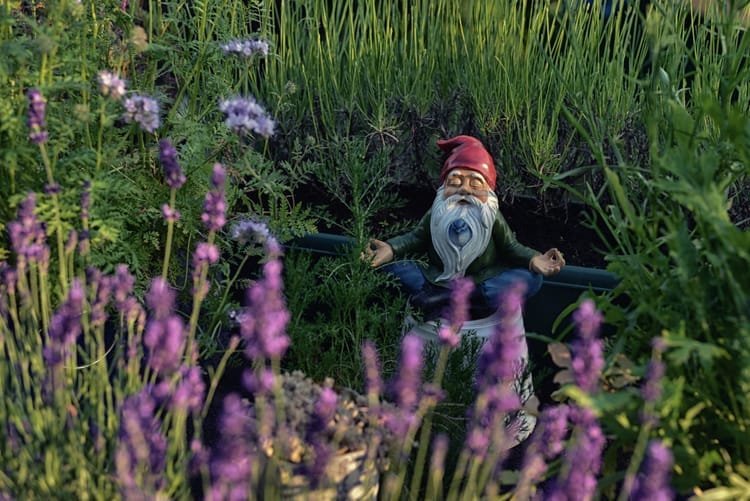The Dutch art of doing nothing

Even though I no longer teach languages, I still have evening conversation classes with a few old students. Last week, one of them told me it was our "three-year anniversary" (three years since he started taking classes with me) and that I actually know more about him than many of his acquaintances do 😂
Generally speaking, what most surprised me when I started teaching—and quickly became my favorite aspect of the job—was how much people enjoyed opening up and talking about life, both on a personal level and in broader terms. Maybe it’s just me inviting these kinds of conversations, but we often end up discussing what living is actually all about, and I’m always so impressed by how willing they are to do so in a language that isn’t their mother tongue.
A familiar issue
A few days ago, one of my students started class by saying he feared he had become addicted to his phone. When I jokingly asked what the symptoms of his addiction were, he replied, "Well, I grab the phone, and then I spend an ungodly amount of time on it...!"
He added that he barely uses social media and always looks for "the good stuff"—interesting articles, important news updates, thought-provoking editorials. But he still spends five hours on his phone each day, which seems to be close to the average.
"Funny you should mention that," I replied, sharing how I had just written a post on "brain rot", Oxford's 2024 Word of the Year. We started discussing what science says about new technology and our ability to focus, and what life was like before the advent of smartphones.
Once upon a time
As I’ve shared before, I’m currently reading The Magic Mountain by Thomas Mann, and I told my student how struck I was by the slow pace of life described in the book—something almost unimaginable today.
Sure, the novel takes place in a sanatorium, where patients aren’t expected to do much and have ample time to rest and relax. But even if money and time weren’t an issue, who among us would be fine with spending months on end lying on a terrace for hours, breathing in the mountain air with nothing but a book or a days-old newspaper for entertainment? Who would enjoy their walks with no music or podcasts to listen to? Who would be okay with the only distractions being an occasional conference or concert?
From limitless imagination to digital overload
I had my first mobile phone in high school and my first smartphone at university, so I still remember being a kid with nothing but crayons, books, and my imagination to fill the time. In primary and middle school, I used to love observing people and would walk around with a notebook to write down my observations or make quick sketches. I was perfectly fine spending hours at the library with no distractions.
Yet now, I set up monthly challenges just to encourage myself to be more mindful of my phone use. I’d rather do Duolingo on the subway than observe the people around me. And it's become unusual for me to take a walk without listening to a podcast.
And I’m not the exception. Many of us won't even watch TV without using our phones at the same time! There's also a name for that, "second-screening", and new studies are underway on the implications of what that is doing to our brains.
Niksen: the Dutch art of doing nothing
As we talked about how incapable we've become of experiencing boredom and spending time doing nothing, my student, who’s Dutch, uttered one word: "Niksen".
Niksen roughly translates to "doing nothing" or "idleness for its own sake". It’s different from meditation, which requires focus, or mindfulness, which encourages present awareness. Niksen is about truly doing nothing and simply letting your mind wander. It might involve activities like staring out the window, sitting quietly with a cup of tea, people-watching without checking your phone, or lying on the couch and daydreaming.
In Dutch culture, Niksen is often seen as an antidote to hustle culture, where busyness is glorified. It embraces the idea that being unproductive sometimes is essential for well-being.
Your brain and creativity will thank you
But what if Niksen isn’t just a quirky Dutch idea—what if it’s something we need to reclaim in our lives?
Intentional moments of rest and boredom have many benefits, like boosting creativity, aiding problem-solving, improving learning and productivity, and recharging and regulating our emotions. And yet many of us will instinctively reach for our phones rather than allow ourselves to simply be.
Let's try it?
I’ve been experimenting with small Niksen breaks throughout my day, and I rediscovered how much I actually enjoy daydreaming, or watching people go by outside of my window.
If this idea resonates with you, I’d love to hear your thoughts:
- Do you struggle with doing nothing?
- Have you ever tried practicing Niksen without realizing it?
- Would you be willing to experiment with intentional idleness?
Share your experience in the comments, and remember you can book a free mindful chat—a safe space for you to be heard and explore what’s on your mind, and a way for me to connect and better understand how I can create content that has an impact. Also, help me reach more people by sharing this post with anyone who might find it useful.



Member discussion